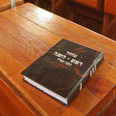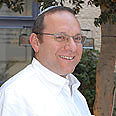


A Ynet-Gesher poll reveals that, as in previous years, the majority of the public plans to fast on the Day of Atonement and many will also visit their local synagogue.
The survey was conducted by the Panels research institute through the Panel4All Internet panel, among 502 respondents over the age of 18 – a representative sample of the adult Jewish population in the State of Israel. The maximum sampling error was 4.3%.
Asked, "Do you plan to fast this year on Yom Kippur?" about 64% said yes and 32% said no. The rest said they had yet to decide.
An analysis of these results shows that a majority of Israelis who won't fast was found only among the secular respondents (59%), while most of the ultra-Orthodox/religious (100%) and traditional Jews (86%) plan to fast.
In another chapter of the survey, respondents were presented with several ways to mark Yom Kippur and asked to note which of the options best describes their plans for the holy day.
Forty-six percent said they would visit the synagogue (including 25% who plan to take part in all prayers and 21% who plan to participate in some), 36% would devote the quiet day to some "quality time" with themselves or their family, 10% would spend the day watching films, 3.5% would visit friends or family, 0.5% said they planned to travel, and 4% did not pick any of the options.
An analysis of these findings reveals that haredim (100%), religious Jews (96%) and traditional Jews (60%) favor the synagogue, while seculars (53.5%) prefer to stay at home – either alone or with their family.
Alternative events?
An absolute majority of the public (77%) has intention of attending alternative events such as study session, meditation, self-examination and secular prayers on Yom Kippur. Fourteen percent will consider going if they hear of such an event or are invited to one, only 3% will definitely participate, and 6% have yet to decide.
Each sector has a clear majority that will not attend such events (from 70% of seculars to 95% of haredim).
Nonetheless, a majority of the public has no problem with the alternative methods: Some 40.5% said they understood that each person should be allowed to mark Yom Kippur the way he or she sees fit, and 25% even view it as a positive thing, which creates a connection to the holy day even for people who don't find the traditional way suitable.
On the other hand, 20.5% believe that the alternative ways miss out on the true meaning of the day, and 9% view it as a negative phenomenon that harms Jewish tradition. The remaining 5% refused to answer the question.
An analysis according to religious affiliation reveals that haredim (81%) and religious Jews (79%) view such alternative events unfavorably, while seculars (86%) and traditional Jews (64%) see them as a positive thing.
According to Gesher Executive Director Ilan Geal-Dor, "A day like Yom Kippur can and should be used as a basis for a shared Jewish identity of the Israeli society. There is mutual respect for the heritage this day symbolizes, even if it is marked in different ways.
"Marking the day serves as a basis for a bridge and dialogue between different parts of the Jewish people, and if we would all be open and accepting towards others – we have a joint future as well."















